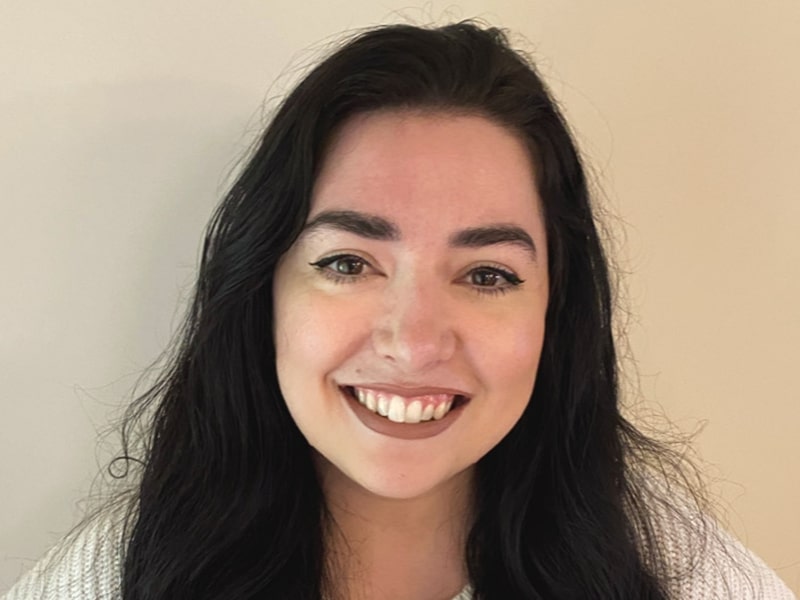Inspired by critical thinking at the School of Social Work, Michelle Rolfe explores anti-oppressive practice in child protection

Michelle Rolfe, master of social work student, explores anti-oppressive practices in child protection.
I recently caught up with Michelle Rolfe, a master of social work student at the Faculty of Community Services (FCS), to learn more about her master’s research project (MRP) and graduate studies experience. Once completed, this paper, and others can be found online through the library. In her own words:
What is the subject of your research project? What attracted you to this subject matter?
My MRP explores anti-oppressive practice (AOP) in child protection. I worked in child protection for over two and a half years, and I knew we needed to start having this conversation about AOP and its implementation in our practices. AOP is an interdisciplinary approach primarily rooted within the practice of social work that focuses on eliminating socioeconomic oppression. In social services it intends to challenge any possible oppressive practices and help in delivering social services in an inclusive manner.
Why did you choose to do this work at the School of Social Work at FCS?
I always aligned with the School of Social Work’s critical school of thought that would encourage this critical thinking around AOP. The professors, colleagues, and agencies we work with are incredible and are doing all the AOP work beyond the doors of the virtual classroom, which resonated with me. Faculty members including professors Lynn Lavallee, Purnima George, and May Friedman inspired my work and helped me develop new perspectives. My MRP supervisor, professor Funke Oba, offered patience and a wealth of experience in child protection that helped me achieve this milestone!
How has COVID-19 affected your research project?
This pandemic year has been my first ever taking an online class, so I needed to shift my learning style to work from home. The online reality of the pandemic changed how social workers engage with the folks we work with. It also provided new opportunities to engage those constituencies and the world!
What do you see for your future, and the impact of your research?
I hope the people who need to read this research do. I want to reach people who work in child protection, especially those who make policy decisions in child protection. I want to impact the way we think about and practice child protection. I hope to follow this graduate work with doctoral work to expand on my MRP research into a PhD!
What have been some highlights of your MRP experience?
It was truly a privilege to share space with my subjects by interviewing participants and hearing the power and passion in their responses to change the child protection system. The respondents poured their heart, soul, and passion into their responses. It was a privilege to share that space with them. One participant said something that still resonates with me: “things need not be voluntary when it comes to equity.” In addition, my MSW placement agency, WomenatthecentrE (external link) , was so incredibly supportive when it came to work/school/life balance and completing the massive project that is the MRP.
What have been some unexpected obstacles on your journey? How have you overcome them?
Navigating mental health, COVID-19 and this significant milestone for me -- it truly was a journey that I was not expecting. It was really important (and challenging) to find ways to move my body. Reframing movement as moving your body rather than exercise and being kind to what your body looks like surviving a pandemic. It is essential to take breaks and be transparent about what you are going through to receive the support needed. The faculty in the social work department are so kind, empathic and supportive. During her class, Lynn Lavallee said, “perfection is colonial,” which has resonated with me beyond the ‘virtual classroom’ to engage in the lifelong journey of decolonizing my way of moving through the world.
What would you say to someone considering graduate work at the School of Social Work or one of the other schools at FCS?
DO IT. There is so much growth, potential and passion that you will discover about yourself. It's a journey with ups and downs, but it truly is worth every moment to be where I am now.
Graduate work can be all-consuming. What are some things you do to maintain a work-life balance?
I take a heels dance class (when we are allowed)! I have always loved dance growing up, but having this space as an adult is really therapeutic, empowering and fun!
Graduate Research Series
This past summer graduate students at the Faculty of Community Services (FCS) were invited to tell us about their research projects and graduate studies experience. This is part of a series of introductory profiles about graduate students, their research and their advice for prospective graduate students. It is our hope you are as inspired by their research efforts and success as we are. If you would like to submit a story idea for consideration please contact Bonte Minnema at bminnema@torontomu.ca.


